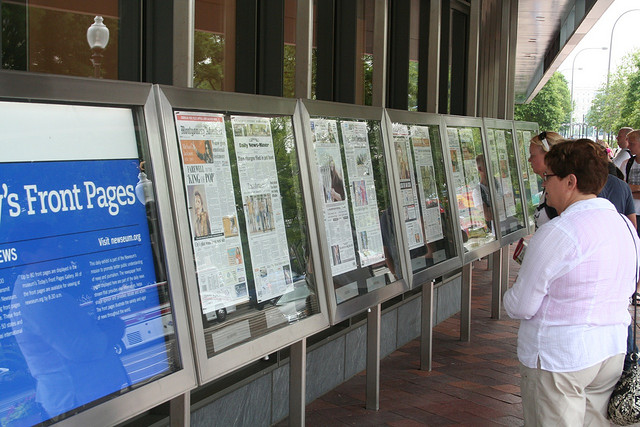The Department of Education has just announced a new initiative – #GoOpen . The initiative is intended to encourage school districts and educators to make greater use of open resources.
To encourage the development and dissemination of resources, two specific “opportunities” were identified.
- First, resources generated as a consequence of federal grant funding should be made available as open resources.
- Second, multiple commercial entities (Amazon, Microsoft, Edmodo, ASCD) will put their resources behind curating, serving and training initiatives associated with open resources.
Grant byproducts
The one thing here that I see as a mild opportunity is the requirement related to grant projects. However, unless new grant initiatives are offered specifically to create content in a form appropriate to distribution what is generated already is either not ready for prime time OR is already available. I make these statements based on personal experience.
Some examples follow:
I worked with my wife’s million dollar Teaching American History grant. The whole purpose of this grant was to organize lessons allowing K-12 students to use primary sources in learning about history. Part of the grant funded a server that made these resources available. This server was maintained for multiple years after the end of the funding cycle and eventually shut down. Potentially, this content could have been transitioned to servers provided by the GoOpen partners, but there would have been costs in doing so. During the years the resources were freely available, any cost in placing the resources on additional servers would have been redundant. In addition, the professional development associated with the transition from textbook-based history instruction to the use of primary source resources was likely the main contribution for those classrooms using the resounces.
My work in developing and evaluating tools to improve introductory college student study of textbook intensive content was partially grant based. Some my earliest software developed for this program was specific to a particular operating system. My later efforts were Internet-based and cross platform. All efforts were customized for individual textbooks. This software would have very limited value for others because a) considerable effort would be required to prepare the backend database for a particular textbook and b) the software was not designed for instructors with limited technology skills. Without a knowledge of PHP, MySQL, etc., a novice user would require either considerable support or an additional development effort to make the software more user friendly. The software may have been of some value to a book compnay looking to improve the supplemental resources accompanying a textbook and willing to invest in futher development.
My point – much grant-supported activity does not involve the allocation of time and resources to make what has been accomplished transportable. I know that “continuation” is an issue to be addressed in many grants, but this often seems to be interpreted as “how will the grantee” continue the work once funding ends.
What about the promises from the commercial providers?
I am trying to find a way both to think through and explain what I think of various companies (e.g., Edmodo, Amazon, Google) making commitments to the #OpenEd initiative.
Imagine a hypothetical situation in which Hardees somehow convinces McDonalds to give away McDonalds french fries at all Hardees locations. Which business would you interpret as being most altruistic? Which business would you interpret as being most foolish? Would it matter whether the french fries were provided in Hardees or McDonalds’ packaging?
I have little appreciation for what companies offering to host and serve the resources provided by others are providing. Even if no ads or other sources of revenue are involved, getting customers “in the door” when other services that do generate revenue exist is alway part of the business plan. I guess this is where my Hardees and McDonalds scenario breaks down. Hardees is likely to sell a burger and a soda to supplement the free french fries so I guess they might actually promote McDonald fries.
Educators are always looking for “free stuff”. I get that. Educators often have inadequate budgets to provide learning experiences to their students and either do without or subsidize their instruction out of pocket. I am just not a fan of free. I understand the process of creating educational resources and offering them for a price. I know for certain what labor was required to generate that content. To me, content generation is just another way to teach and like any teacher I assume the work invested should be appreciated and compensated.
There are important questions here. What about education is over-priced and who gets to decide? Are educational materials too expensive? Are teachers, administrators and other school personnel paid too much? How can those “in the middle” (administrators, school board members) make ethical decisions when compensating “in the flesh” people you see and invisible workers you do not face?
I am guessing the #GoOpen will surface some resources. I just do not see the resources to be made available as solving a meaningful or expensive problem.
If the Department of Education wants to offer lower cost resources, then it would seem most productive to offer grants for the development of what commercial entities already provide. This approach would likely encounter considerable opposition from those who believe that the private sector can do everything more efficiently than the government, but it might encourage a little more innovation (if that is what was emphasized in the grant process) and it change how the generation of educational resources are funded. The location of the competition would be shifted from what now occurs between different companies to the grant award process.
![]()

You must be logged in to post a comment.